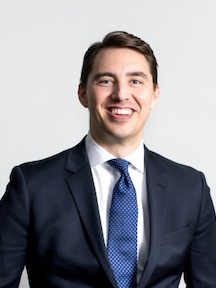By Nick A. Cohen
Peter Frosch (ΦBK, Northwestern University) is a coalition-builder. Throughout his successful career in public policy and regional economic development, he has vigorously pursued unique partnerships, both among individuals and organizations as well as between ideas and concepts. He began practicing this skill as an undergraduate studying history and American studies; now, as Frosch takes the reigns of GreaterMSP, a nationally-recognized regional development partnership, he is ready to further reinvest in the lessons of his education to ensure that GreaterMSP will continue to lead the nation in its innovative approach to development.
After completing his studies at Northwestern University, Frosch earned a master’s degree in international relations at Dublin City University in Ireland, where he was a George Mitchell Scholar. He then went on to lead several high-profile policy initiatives, including successfully lobbying for a constitutional amendment in the state of Minnesota to fund clean water initiatives. As the Legislative Director for a Minnesota congresswoman, Frosch helped to modernize the federal government’s approach to international food security before transitioning to a focus on local infrastructure initiatives. These local projects, which included the expansion of regional public transportation in the Twin Cities area as well as facilitating investments in new energy technologies, taught Frosch about the great potential in and the immense struggles facing local and regional economies.
With this newfound focus on regional issues, Frosch joined GreaterMSP and worked to create one of the country’s leading economic development indicators, a model which is now employed all across the nation. In addition to this dashboard indicator, which included not just traditional economic metrics such as GDP and unemployment rates but also metrics designed to measure social and environmental impacts on the economy, Frosch focuses on facilitating partnerships in the Twin Cities region that will help all sectors of the economy grow in ways that account for future struggles and needs. One of the keys to success in this endeavor is the ability to anticipate. “The person who’s ready for what arrives is best positioned to win. Otherwise you’re always running behind, trying to catch up,” Frosch instructed, drawing parallels between individual preparedness and communal preparedness.
Part and parcel with anticipation is the expectation of change. In today’s variegated economy, with different factors impacting each other in diverse and complex ways, Frosch offered that change is the only constant. Even if community partners can agree on the challenges facing a certain region, they are not always exactly sure how to achieve the desired results. In the face of this uncertainty, everyone must be prepared to reassess old practices and innovate. “We’re all going to be entrepreneurs…we’re going to expect that we will have to iterate and evolve constantly,” Frosch said.
Fortunately, according to Frosch, we are in a prime epoch to evolve rapidly and innovate effectively. With more data, metrics, and analytical tools at our fingertips than ever before, policy practitioners now have the ability to step back from questions of what and start answering questions of so what. “The data and the analysis help us determine what is going on, but it does not help answer the question of what it all means. It doesn’t tell us what we should do about it,” Frosch explained, adding that there is “great value-creation in the meaning-making of all of the information that we have access to.”
In Frosch’s estimation, one of the best ways to attain both the technical skills to engage in and understand the metrics as well as the theoretical perspective to propose innovative solutions to the problems housed in data is through a liberal arts education. “My liberal arts education was about having the capability and the interest in asking and answering those questions [on how to make meaning of data],” Frosch reflected. “In Congress, I found great benefit in my history degree. There is always a contest around the framing of issues in Congress, so knowing American history really well was a very powerful skill in helping to communicate some of the work that we tried to do.”
Today, Frosch draws on his experience studying international relations to create innovative solutions for regional issues. “I found the thinking and some of the structure of international problem-solving to be one of the best guides for me to think about how to structure regional partnerships,” he explained. “One of the commonalities that we see in the international system and in the regional level is the unit or the scale of the problem. There is a lack of control. There are many global systems, but there’s no command-and-control global authority. That is also true at the regional level. So what you’re solving for is how to build adaptive coalitions and manage different sources of power and influence to achieve some collective good. At that level, [the two systems] are not that dissimilar.”
A commitment to lifelong learning is essential in encouraging innovative and interdisciplinary problem-solving. Liberal arts education allows students to begin building skills of pattern recognition so as to adapt and apply lessons in one area to problems in another. According to Frosch, one of the benefits of organizations that continually champion the necessity of the liberal arts, and especially The Phi Beta Kappa Society, is that it encourages “an embrace of excellence” in academic studies. And for Frosch, this academic embrace of excellence has led to “a high expectation of quality…in the space of significant demand and stretched resources.” In other words, his broad academic studies have allowed him to succeed in identifying, anticipating, and innovatively resolving public policy issues. Frosch’s experience serves as an example of the power of a liberal arts training in informing the unique solutions that will be required to resolve today’s most pressing policy issues.
Nick A. Cohen (ΦBK, Carleton College) recently completed his bachelor’s degree in international relations with a minor in European studies. Carleton College is home to the Beta of Minnesota chapter of Phi Beta Kappa.




